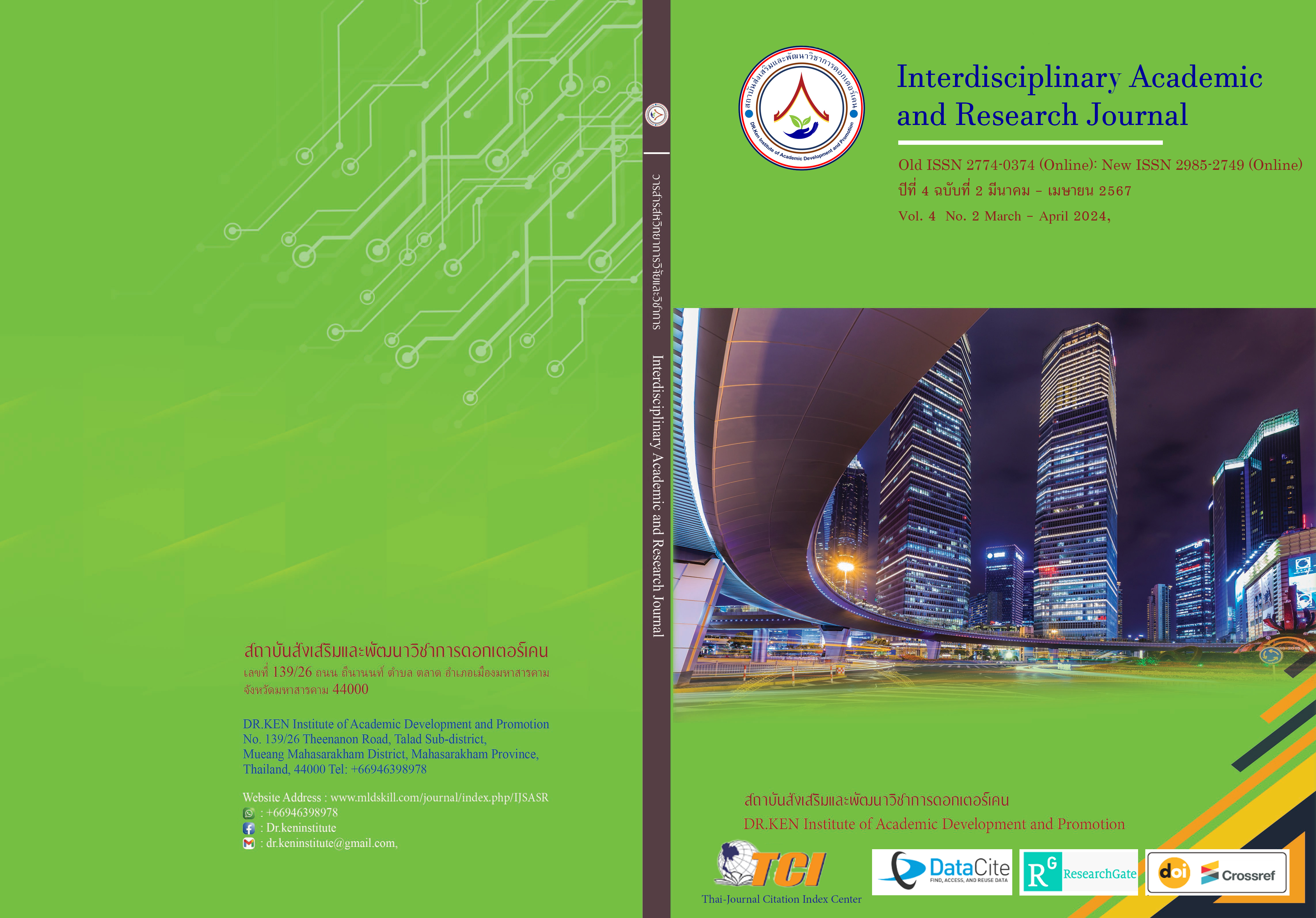Guidelines for Developing Academic Administration in Schools under The Secondary Educational Service Area Office Buriram
DOI:
https://doi.org/10.60027/iarj.2024.274660Keywords:
Guidelines for Development; , Academic Administration; , SchoolsAbstract
Background and Aims: Academic administration is considered important in schools. Because academic administration in schools is all kinds of activities, Improving teaching for students to achieve the most effective results. Therefore, this research aims to 1) study the current, desirable state and priority need index of academic administration of schools under the secondary educational service area office Buriram. 2) study the guidelines development of academic administration of schools under the secondary educational service area office Buriram.
Methodology: The research process was divided into 2 phases: Phase 1; to study the current state, desirable state, and need analysis for academic administration in schools. The sample group used in the research was administrators and teachers, 311 people. The research tool was a questionnaire, confidence of the whole .77. The statistics used for data analysis were mean, percentage, and standard deviation. Phase 2; to study guidelines for developing academic administration in schools. The target group is 5 experts. The research tool was interview form and data analysis by content analysis.
Results: 1. The current state overall was low level, and the desirable state overall was at a high level. The need assessment for academic administration in schools ranked from high to low level was 1) development of Instructional 2) educational supervision 3) measurement and evaluation 4) curriculum development 5) development of Innovative media technology of education 6) internal quality assurance and educational standard. 2. Guidelines for the academic administration of the school Under secondary educational service area office Buriram, consists of 15 guidelines, including curriculum administration with 3 guidelines, learning process development with 3 guidelines, educational supervision with 1 guidelines, measurement and evaluation with 3 guidelines, internal quality assurance and educational standards with 2 guidelines, and development of educational media, innovation, and technology 3 guidelines.
Conclusion: The school academic administration that has the greatest need is the development of the learning process. The guidelines section consists of 15 guidelines as follows: Development of Instructional, guidelines are 1) child Center Learning 2) learning for the development of learners' potential and excellence 3) development in learning management for teachers. Educational supervision, guidelines are participation in educational supervision Measurement and evaluation, guidelines are 1)creation and development of tools for measurement and evaluation 2) participation for measurement and evaluation 3) regulation Guidelines and patterns of measurement and evaluation. Curriculum development, guidelines are 1) the school curriculum created 2) the goal, and vision of the school curriculum 3) the analysis of the core curriculum Development of innovative media technology in education, guidelines are 1) analysis of necessary for the use of innovative media technology of education 2) support for media Innovation and learning management technology Internal quality assurance and educational standards, guidelines are 1) analyze vision and goals of internal quality assurance and educational standards planning 2) creation and development of assessment and measurement tools for internal quality assurance and educational standards.
References
กระทรวงศึกษาธิการ. (2546). พระราชบัญญัติการศึกษาแห่งชาติ พุทธศักราช 2542 แก้ไขเพิ่มเติม (ฉบับที่ 2 พุทธศักราช 2545). กรุงเทพฯ : คุรุสภา.
กระทรวงศึกษาธิการ. (2550). กฎกระทรวงกาหนดหลักเกณฑ์และวิธีการกระจายอานาจการบริหาร และ การบริหารการจัดการศึกษา พ.ศ. 2550. กรุงเทพฯ : ชุมนุมสหกรณ์แห่งประเทศไทย.
กระทรวงศึกษาธิการ. (2552). หลักสูตรแกนกลางการศึกษาขั้นพื้นฐาน พ.ศ. 2551. กรุงเทพฯ : ชุมนุมสหกรณ์แห่งประเทศไทย.
กระทรวงศึกษาธิการ. (2553). แนวทางการจัดกิจกรรมพัฒนาผู้เรียนตามหลักสูตรแกนกลางการศึกษาขั้นพื้นฐาน พุทธศักราช 2551. กรุงเทพฯ : โรงพิมพ์ชุมนุมสหกรณ์การเกษตรแห่งประเทศไทย.
กระทรวงศึกษาธิการ. (2560). ตัวชี้วัดและสาระการเรียนรู้แกนกลางกลุ่มสาระการเรียนรู้คณิตศาสตร์ (ฉบับปรับปรุง พ.ศ. 2560) ตามหลักสูตรแกนกลางการศึกษาขั้นพื้นฐาน พุทธศักราช 2551. กรุงเทพฯ : โรงพิมพ์ชุมนุมสหกรณ์การเกษตรแห่งประเทศ ไทย
กระทรวงศึกษาธิการ. (2561). แนวทางการพัฒนาระบบการประกันคุณภาพการศึกษาตามกฎกระทรวงการประกันคุณภาพการศึกษา พ.ศ. 2561. กรุงเทพฯ : สำนักทดสอบทางการศึกษา สำนักงานคณะกรรมการการศึกษาขั้นพื้นฐาน.
กาญจน์ เรืองมนตรี และธรินธร นามวรรณ. (2554). การบริหารวิชาการและนวัตกรรมการจัดการเรียนรู้. มหาสารคาม : อภิชาตการพิมพ์.
จันทรานี สงวนนาม. (2553). ทฤษฎีและแนวปฏิบัติในการบริหารสถานศึกษา. พิมพ์ครั้งที่ 3. นนทบุรี: บุ๊คพอยท์.
จีณัญญาพัจน์ โคตรหลักคำ. (2559). แนวทางการบริหารงานวิชาการของโรงเรียนมัธยมศึกษา สังกัดสำนักงานเขตพื้นที่การศึกษามัธยมศึกษา เขต 19. วิทยานิพนธ์ศึกษาศาสตรมหาบัณฑิต (การบริหารการศึกษา คณะศึกษาศาสตร์): มหาวิทยาลัยมหาสารคาม.
ชนิดา วิสะมิตนันท์. (2555). กลยุทธ์การบริหารราชการการจัดการแหล่งเรียนรู้ที่เป็นระบบและเอื้อต่อการจัดประสบการณ์การเรียนรู้ที่เน้นผู้เรียนเป็นสำคัญ. สงขลา : หน่วยศึกษานิเทศก์ กรมสามัญศึกษา เขตการศึกษา 3.
ธัญดา ยงยศยิ่ง. (2559). การบริหารงานวิชาการของผู้บริหารสถานศึกษา สังกัดสำนักงานเขตพื้นที่การศึกษาประถมศึกษายะลา เขต 3. การค้นคว้าอิสระครุศาสตรมหาบัณฑิต (การบริหารการศึกษา): มหาวิทยาลัยราชภัฎยะลา
รุ่งชัชดาพร เวหะชาติ. (2550). การบริหารงานวิชาการสถานศึกษาขั้นพื้นฐาน. สงขลา: มหาวิทยาลัยทักษิณ.
วรรณภา แซ่ตั้น. (2556). การบริหารงานวิชาการของโรงเรียนขยายโอกาสทางการศึกษากลุ่มบูรพาศึกษา สำนักงานเขตพื้นที่กำรศึกษาประถมศึกษานครปฐม เขต 1. วิทยานิพนธ์ศึกษาศาสตรมหาบัณฑิต (การบริหารการศึกษา): มหาวิทยาลัยศิลปากร.
สำนักงานเขตพื้นที่การศึกษามัธยมศึกษาบุรีรัมย์. (2566). ข้อมูลบุคลากรทางการศึกษาสังกัดสำนักงานเขตพื้นที่การศึกษามัธยมศึกษาบุรีรัมย์. บุรีรัมย์: สำนักงานเขตพื้นที่การศึกษามัธยมศึกษาบุรีรัมย์.
สำนักงานคณะกรรมการการศึกษาขั้นพื้นฐาน. (2562). แนวทางการนิเทศภายในโดยใช้ห้องเรียนเป็นฐานเพื่อพัฒนาคุณภาพผู้เรียน. กรุงเทพฯ : หน่วยศึกษานิเทศก์ สำนักงานคณะกรรมการการศึกษาขั้นพื้นฐาน.
สำนักงานเลขาธิการสภาการศึกษา. (2562). รายงานความก้าวหน้าการจัดการเรียนรู้ ระดับการศึกษาขั้นพื้นฐานปี 2561-2562. กรุงเทพฯ: สำนักงานเลขาธิการสภาการศึกษา.
สำนักวิชาการและมาตรฐานการศึกษา. (2551). แนวทางการบริการจัดการหลักสูตรตามหลักสูตรแกนกลางการศึกษาขั้นพื้นฐาน พุทธศักราช 2551. กรุงเทพฯ : ชุมนุมสหกรณ์การเกษตรแห่งประเทศไทย
สุวิมล ว่องวาณิช. (2558). การวิจัยประเมินความต้องการจำเป็น. พิมพ์ครั้งที่ 3. กรุงเทพมหานคร: ทวีพริ้นท์ จำกัด.
เสาวณี ตรีพุทธรัตน์.(2554). การบริหารงานวิชาการ. ขอนแก่น: คณะศึกษาศาสตร์ มหาวิทยาลัยขอนแก่น.
Cronbach, L.J. (1970). Essentials of Psychological Testing. 3rd edition. New York: Harper. And Row.
Krejcie, R.V. & Morgan, D.W. (1970). Determining Sample Size for Research Activities. Educational and Psychological Measurement, 30(3), 607-610.
Downloads
Published
How to Cite
Issue
Section
License
Copyright (c) 2024 Interdisciplinary Academic and Research Journal

This work is licensed under a Creative Commons Attribution-NonCommercial-NoDerivatives 4.0 International License.
Copyright on any article in the Interdisciplinary Academic and Research Journal is retained by the author(s) under the under the Creative Commons Attribution-NonCommercial-NoDerivatives 4.0 International License. Permission to use text, content, images, etc. of publication. Any user to read, download, copy, distribute, print, search, or link to the full texts of articles, crawl them for indexing, pass them as data to software, or use them for any other lawful purpose. But do not use it for commercial use or with the intent to benefit any business.
















.png)


